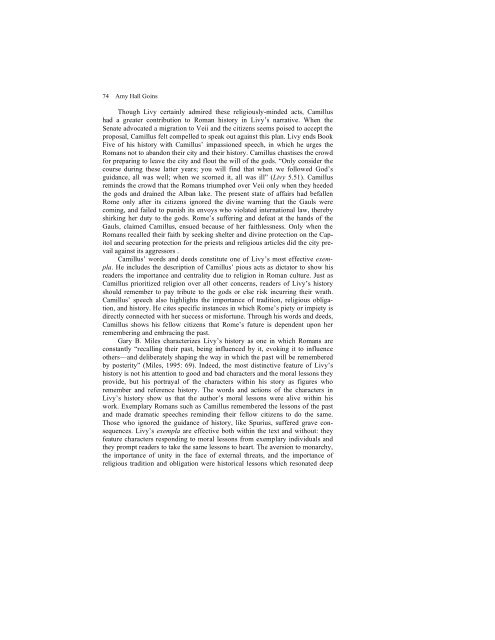Create successful ePaper yourself
Turn your PDF publications into a flip-book with our unique Google optimized e-Paper software.
74 Amy Hall Goins<br />
Though Livy certainly admired these religiously-minded acts, Camillus<br />
had a greater contribution to Roman history in Livy’s narrative. When the<br />
Senate advocated a migration to Veii and the citizens seems poised to accept the<br />
proposal, Camillus felt compelled to speak out against this plan. Livy ends Book<br />
Five of his history with Camillus’ impassioned speech, in which he urges the<br />
Romans not to abandon their city and their history. Camillus chastises the crowd<br />
for preparing to leave the city and flout the will of the gods. “Only consider the<br />
course during these latter years; you will find that when we followed God’s<br />
guidance, all was well; when we scorned it, all was ill” (Livy 5.51). Camillus<br />
reminds the crowd that the Romans triumphed over Veii only when they heeded<br />
the gods and drained the Alban lake. The present state of affairs had befallen<br />
Rome only after its citizens ignored the divine warning that the Gauls were<br />
coming, and failed to punish its envoys who violated international law, thereby<br />
shirking her duty to the gods. Rome’s suffering and defeat at the hands of the<br />
Gauls, claimed Camillus, ensued because of her faithlessness. Only when the<br />
Romans recalled their faith by seeking shelter and divine protection on the Capitol<br />
and securing protection for the priests and religious articles did the city prevail<br />
against its aggressors .<br />
Camillus’ words and deeds constitute one of Livy’s most effective exempla.<br />
He includes the description of Camillus’ pious acts as dictator to show his<br />
readers the importance and centrality due to religion in Roman culture. Just as<br />
Camillus prioritized religion over all other concerns, readers of Livy’s history<br />
should remember to pay tribute to the gods or else risk incurring their wrath.<br />
Camillus’ speech also highlights the importance of tradition, religious obligation,<br />
and history. He cites specific instances in which Rome’s piety or impiety is<br />
directly connected with her success or misfortune. Through his words and deeds,<br />
Camillus shows his fellow citizens that Rome’s future is dependent upon her<br />
remembering and embracing the past.<br />
Gary B. Miles characterizes Livy’s history as one in which Romans are<br />
constantly “recalling their past, being influenced by it, evoking it to influence<br />
others—and deliberately shaping the way in which the past will be remembered<br />
by posterity” (Miles, <strong>19</strong>95: 69). Indeed, the most distinctive feature of Livy’s<br />
history is not his attention to good and bad characters and the moral lessons they<br />
provide, but his portrayal of the characters within his story as figures who<br />
remember and reference history. The words and actions of the characters in<br />
Livy’s history show us that the author’s moral lessons were alive within his<br />
work. Exemplary Romans such as Camillus remembered the lessons of the past<br />
and made dramatic speeches reminding their fellow citizens to do the same.<br />
Those who ignored the guidance of history, like Spurius, suffered grave consequences.<br />
Livy’s exempla are effective both within the text and without: they<br />
feature characters responding to moral lessons from exemplary individuals and<br />
they prompt readers to take the same lessons to heart. The aversion to monarchy,<br />
the importance of unity in the face of external threats, and the importance of<br />
religious tradition and obligation were historical lessons which resonated deep

















